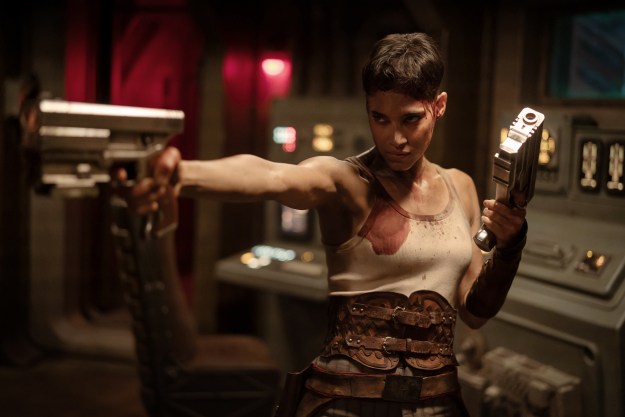The Best Actress category is continuously one of the highlights in every year’s Oscar ceremony; indeed, it might be why many fans tune in. There’s something special about the category, which often bears no co-relation with Best Picture. The Oscars represent many things, but glamour and status are two of its most notable qualities, and what’s more glamorous or esteemed than Best Actress?
- 10. Meryl Streep – The Iron Lady (2011)
- 9. Renée Zellweger – Judy (2019)
- 8. Emma Stone – La La Land (2016)
- 7. Frances McDormand – Three Billboards Outside Ebbing, Missouri (2017)
- 6. Jennifer Lawrence – Silver Linings Playbook (2012)
- 5. Julianne Moore – Still Alice (2014)
- 4. Brie Larson – Room (2015)
- 3. Natalie Portman – Black Swan (2010)
- 2. Olivia Colman – The Favourite (2018)
- 1. Cate Blanchett – Blue Jasmine (2013)
The 2010s were a time of cinematic excellence, and the decade’s Oscar winners are a perfect representation. Best Actress, specifically, includes a class of worthy and exceptional winners, a couple of whom might even go down in history as having given some of the all-time best performances in the category. Still, not every winner is equally beloved, and while there are always fans of each winner, some of the Academy’s choices have become less popular as time goes by.

10. Meryl Streep – The Iron Lady (2011)

Meryl Streep is an acting institution. Arguably the greatest living actress, Streep delivers one standout performance after the other, spoiling audiences and raising the bar for everyone, especially herself. Streep is still at the top of her game at 72, receiving her latest Oscar nomination in 2017 for Steven Spielberg’s The Post, one of her finest performances.
So why is her win for 2011’s The Iron Lady so divisive? Streep is always best when she’s at her least Oscar-y, and The Iron Lady is her at her most. She nails Thatcher’s voice and mannerisms, but she’s doing an almost by-the-numbers performance in an equally by-the-numbers movie. For the first time in her esteemed career, Streep doesn’t elevate the material but rather uncomfortably blends with it. The Iron Lady is full of self-doubt, reducing Thatcher to her simplest version in a clumsy attempt to make her sympathetic for an audience whose opinion on the divisive PM was never going to change.
9. Renée Zellweger – Judy (2019)

Judy Garland, arguably the most tragic actress of classic Hollywood, is an almost mythical figure, the ultimate victim of the studio machine. Logically, when it was announced that Renée Zellweger, herself an Oscar winner returning from an extended hiatus, would be playing her, all bets were off. Surely, this would be Zellweger’s return to the Kodak Theater, 16 years after her win for Cold Mountain.
Indeed it was, but like her win for Could Mountain, Zellweger’s triumph for Judy was divisive at best. Like Streep, Zellweger is pure Oscar bait in the role, and while she genuinely tries to convey Garland’s distinct persona, she never quite captures her essence; Zellweger might look like Judy, but she isn’t. It doesn’t help that she sings Garland’s classics herself, which, while commendable, further distracts from the portrayal; after all, Renée Zellweger is a perfectly capable singer, but she’s no Judy Garland. No one is.
8. Emma Stone – La La Land (2016)

It’s truly fascinating to revisit La La Land with the benefit of hindsight. Absurdly romantic and undeniably beautiful to look at and listen to, La La Land took everyone by surprise. The film charmed critics and audiences alike, to the point where it matched the all-time Oscar record for most nominations set by Titanic and All About Eve, two films widely considered among the best of all time.
Emma Stone’s equally charming performance rode the La La Land wave, explaining how she managed to sweep the entire awards season. And it is very easy to fall for her spell: Stone’s Mia is wide-eyed and hopeful, yet extremely vulnerable and relatable. Stone is certainly Oscar-worthy, particularly toward the end of the film, when Mia’s dreams crumble around her, and her eleven o’clock number, “Audition (The Fools Who Dream),” plays like an elongated Oscar clip. However, 2016 delivered excellent performances that only seem to improve with age — Amy Adams in Arrival, Ruth Negga in Loving, Natalie Portman in Jackie, and Isabelle Huppert in Elle. Stone’s sweetness doesn’t stand equally with those towering performances.
7. Frances McDormand – Three Billboards Outside Ebbing, Missouri (2017)

Three Billboards Outside Ebbing, Missouri‘s very nature invites controversy; nearly five years after its premiere, the jury is still out about its message and eventual legacy. It’s a shamelessly angry film anchored by a shamelessly angry Frances McDormand, giving a performance that manages to seem hopeful despite, or perhaps because of, all the rage.
McDormand’s win seems to be a product of its time and place: 2017 had a lot of genuine anger, and McDormand, an already bold and disruptive performer, became the perfect symbol for it. Her performance is overwhelming, embodying every bit of the frustration and fury her character feels. McDormand is an open wound, overflowing with emotion and delivering a gargantuan performance that overpowered every other contender that year. Three Billboards is imperfect, and so is McDormand’s portrayal, but then again, she never strives for perfection. Instead, she goes for raw and ruthless realism and succeeds, for better and worse.
6. Jennifer Lawrence – Silver Linings Playbook (2012)

Silver Linings Playbook might be one of the best romantic movies of the new millennium. At times devastatingly sweet and at times plain devastating, the movie is an acidic but ultimately hopeful look at love at its most chaotic. The film elevated Bradley Cooper to “serious” actor territory, but its greatest triumph was cementing Jennifer Lawrence as Hollywood’s most promising starlet.
Indeed, 2012 belonged to Lawrence. The one-two punch of The Hunger Games and Silver Linings Playbook proved she could put butts in movie theater seats and attract critical acclaim while doing it. The Academy loves to invest in its future, and Lawrence is arguably their best investment. It also helps that her performance is genuinely brilliant; mature beyond her years and electrifying, Lawrence is invigorating, with neurosis and sass packed into one fragile and loud widow. Lawrence’s win has its detractors, but it’s hard to argue against a performance that remains fresh and affecting, even 10 years later.
5. Julianne Moore – Still Alice (2014)

Still Alice is Oscar bait of the purest kind. It’s deeply moving and distressing, mainly because of the performance at its center, but it remains a shameless vehicle for Julianne Moore to win her long-overdue Oscar. Moore, one of the most daring and experimental actresses of her generation, came close to winning the Oscar several times before her eventual victory in 2015, but the narrative never seemed to be in her favor. Still Alice provided the perfect path to victory, and Moore made the best of it.
Despite the film’s occasional detour into melodrama, Moore remains grounded, never once becoming detached from her audience. She doesn’t shy away from Alice’s struggle and pain, but also doesn’t overdo it. In restraint, Moore finds truth, and the material is much better because of it. Moore’s victory is a clear case of the Academy rewarding not a single performanc,e but an entire body of work. And yet, who can be angry when looking at such a career? Moore earned her Oscar countless times, with roles like Amber Waves in Boogie Nights or Cathy Whitaker in Far from Heaven. In this case, the work truly speaks for itself.
4. Brie Larson – Room (2015)

Room is a tricky film to discuss. Visceral, at times uncomfortable, but always compelling, the movie delivers a truly rewarding cinematic experience for those who manage to sit through it. With Room, Brie Larson, already an acclaimed yet underrated actress, found a vehicle that perfectly fit her brand of confrontational vulnerability, and she delivered one of her finest turns to date.
Many will say Larson’s best performance is in Short Term 12, and they might be right. Still, her work in Room is simply astonishing: Raw, angry, grim, and heartbreaking. Larson doesn’t shy away from the darkest parts of Joy’s journey, baring them for the audience to see, caring very little for their approval or appreciation. Larson might not want the audience’s sympathy, but she demands their understanding with a layered portrayal that stays with the viewer long after the credits roll. Many will say her performance doesn’t work without Jacob Tremblay, and they are right. However, that is less a dig at Larson’s work and more at the Academy’s egregious omission of Tremblay in the Best Supporting Actor category.
3. Natalie Portman – Black Swan (2010)

The decade started strongly with Natalie Portman claiming the Oscar for her work in Darren Aronofsky’s psycho-sexual horror drama Black Swan. Gorgeously shot, dark, enthralling, and deeply disturbing, Black Swan is arguably the best example of the obsessed artist trope, perhaps only matched by Damian Chazelle’s Whiplash.
Portman, already an Oscar nominee for her supporting turn in 2004’s Closer, is a perfect fit for Aronofsky’s particular brand of unsubtle bravado. She imbues Nina with blatant naiveté, convincingly depicting the girl’s virtue by embodying rather than playing it. When the tables turn, and the role calls for a more brash and confident Nina, Portman rises to the occasion, delivering the most iconic scene from the film — Nina performing the black swan coda — unfazed and in total command of the screen. Nina is a treacherous role, yet Portman deftly navigates the character’s intricacies, resulting in an intense, unnerving, and unforgettable portrayal of repression’s path to ultimate liberation.
2. Olivia Colman – The Favourite (2018)

Yorgos Lanthimos’ dark comedy The Favourite is the rare revisionist film that never betrays its real-life story. Absurd in all the right ways, the movie is cruel, unsympathetic, strangely melancholic, and pitiful while still finding time to be relevant and surprisingly sexy. And at the center of this exceptional mess is the mighty Olivia Colman, delivering the performance of her career.
Colman’s Queen Anne is grotesque, ridiculous, frail, and tremendously compelling. Her portrayal is nothing short of heartbreaking, with the actress guiding the audience through Anne’s pain and frustrations. And yet Colman, one of the most gifted comediennes in the business, still injects the Queen with wit and bite, finding humor in the pain and honesty in the satire. Colman dominates every second she’s on screen, and whenever she’s paired with Rachel Weisz and Emma Stone, absolute magic happens. It’s the performance of a lifetime, worthy of every accolade that rightfully came her way.
1. Cate Blanchett – Blue Jasmine (2013)

It’s hard to describe how amazing Cate Blanchett is in Blue Jasmine. Her performance is transcendent, a true tour de force if ever there was one. The film itself, a veiled update of A Streetcar Named Desire, wears its influence on its sleeve for better and worse. Still, Blanchett and an equally electric Sally Hawkins elevate it, turning Blue Jasmine into one of the most memorable movies of the decade through sheer commitment and might.
Blanchett’s role is unsubtle and to the point. However, she strikes the perfect balance, finding equal strength in Jasmine’s quiet moments as she does in the countless monologues she tirelessly delivers. Jasmine would be too much in less capable hands, a Blanche Dubois knockoff for the Upper East Side. Yet, Blanchett takes the character and reworks it with enough vulnerability to go with the desperation and melancholy. The performance is brutal and theatrical, but Blanchett never lets go of her grip of reality, even as Jasmine does. It might be the crowning achievement of a career full of highlights and further confirmation that Blanchett is the most versatile actress of her generation, seamlessly fitting in tragic comedies, romantic dramas, and bleak noirs like her most recent effort, Nightmare Alley.




